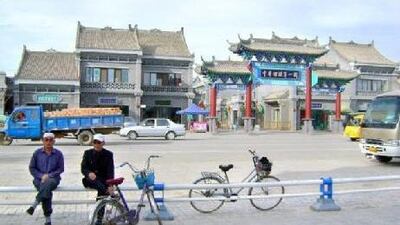When it comes to Chinese exports, most people think of the clothes and electronics shipped from the factories of places such as Guangdong.
Cheap and made by the container load, exports such as these have fuelled the dragon economy's furious economic growth, transforming much of China.
Far from Guangdong and the rest of the southern manufacturing belt, both in geography and character, another area of China is looking to enjoy its share of the spoils of the country's export boom. Ningxia Hui autonomous region, to use the official title, is particularly focusing on exports to the Middle East, and for good reason. Of the region's 6.2 million people, 36 per cent are Muslims, a legacy of the ancient trade links of the Silk Road that gave rise to the Hui ethnic minority.
Ningxia hopes to use its religious and cultural affinities to the Middle East in its aims to become a major exporter, particularly of halal food products. Last month the region's capital city, Yinchuan, hosted the first China-Arab States Economic and Trade Forum as part of its drive to improve economic ties. The forum, intended to become an annual event, was held to coincide with Ningxia's regular international investment and trade fair. Several Arab countries including the UAE took part in both gatherings.
Ningxia hopes to stimulate two-way investment and exports of commodities. "We'll turn Ningxia into an important base linking China and Arab states," says Li Rui, the vice chairman of Ningxia's government. Trade between Ningxia and the Arab world stands at a modest US$60 million (Dh220.3m) a year, just a fraction of the $107.4 billion between China and Arab states last year. Ningxia also wants to increase trade with central and South East Asia, to help cope with a drop in exports to other parts of the world, as business with Europe, Japan and the US was hit by the global financial slump.
The region's ambition fits in with China's aim of developing its western provinces, which have tended to miss out on the rapid development of the eastern and southeastern parts. Ningxia, with its quiet highways and countless villages where piles of corn are laid out as yellow blankets on the ground, has a character far removed from the seemingly never-ending industrial developments near the east coast.
The relative lack of development is perhaps partly a product of the region's isolation. It is a long way from the seaports through which much of China's exports pass. One veteran China analyst at the forum, who asked not to be identified, says this is the major stumbling block. But Ningxia has recently begun flights to Dubai, the Middle East's logistics centre, and officials say this will be a major boost for exports, providing an alternative to sending products from Tianjin port about 900km away.
Ben Simpfendorfer, the chief China economist for the Royal Bank of Scotland and author of the book The New Silk Road, says Ningxia is not going to rival China's coastal provinces in terms of total export revenues. It has a $20bn economy, compared with Guangdong's $580bn economy, and when it comes to products such as clothes and electronics, Ningxia is not likely to become significant. But Mr Simpfendorfer says its aim of selling halal food products, helped by much lower labour costs than those in the Middle East, was a sensible one, although challenges remain.
"Across the Middle East, tastes can be quite different and that will be a major challenge in trying to get their products right," he says. Other Muslim regions, among them Malaysia, are also focusing on halal exports, Mr Simpfendorfer says, adding that the South East Asian country is likely to be aided by economic and agricultural development that is "more sophisticated" than that of Ningxia. "[Ningxia] will find niche products [to export]," he adds. "This could have an important impact on Ningxia's economy because it's a small economy."
To help spark greater exports, Ma Fu, who runs the commerce department of the Ningxia government, says the region is building a 300,000 square metre small commodities centre and an industrial park for Muslim commodities, including halal food. "By doing so we'll be able to ensure purchasers feel the cost of purchasing in Ningxia is much lower than in the coastal regions," Mr Ma says. There are also opportunities outside the halal food sector, Jafar Hassan, the Jordanian minister of planning and international co-operation, said at the forum. Mr Hassan said Ningxia should also look at fields such as science and technology, fertiliser and cotton exports.
Certainly some Arab businesspeople are optimistic about what can be achieved in Ningxia. The Egyptian trader Medhat Refaei, the general manager of a company called Super Link Tec with offices in China and across the Middle East, describes it as "a promising area". Mr Refaei says it has a very strong fruit-growing sector, producing much high-quality organic produce at a low price. Crucially, the local authorities are doing their best to be helpful, he says.
"If you want to make an investment, they can support you with credit facilities," says Mr Refaei, who was exhibiting at the recent investment and trade fair and looking for opportunities to trade with the region. "They want to raise this city like Guangzhou, like Shenzhen as a trading centre."


